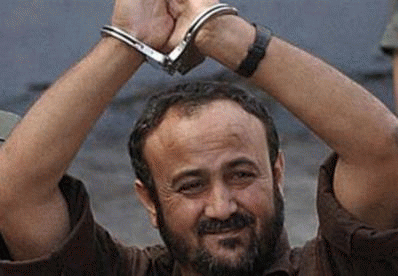From Americans for Middle East Understanding
Perhaps it was fitting that the most significant act of organized mass resistance by Palestinians to the occupation in many years was launched from behind bars. In April of this year more than 1,500 political prisoners began an indefinite hunger strike against their increasingly degrading treatment by the Israeli authorities. Some called it a prison "intifada," the word Palestinians use for their serial efforts to "shake off" Israeli oppression.
Over the past five decades, Israel's incarceration industry is reported to have locked away some 800,000 Palestinians, amounting to 40 percent of the male population. At any moment, there are few families that do not have at least one close relative in jail.
More generally, Palestinians often characterize the occupied territories of Gaza and the West Bank as giant prisons. Checkpoints, permits, walls, fences, settlements, Jewish-only roads, closed military areas and blockades restrict movement so severely that most Palestinians are effectively confined to open-air cells of varying size. The Israeli historian Ilan Pappe's latest book, a history of the occupied territories due out this summer, is titled "The Biggest Prison on Earth" for that very reason. An act of mass defiance by Palestinian prisoners resonates far beyond the concrete walls of Israel's three dozen detention centers.
The hunger strike, under the banner "Freedom and Dignity," was initiated by Marwan Barghouti, the most senior Palestinian official behind bars. One of the leaders of the ruling Fatah movement and the head of its armed resistance at the start of the second intifada, he was sentenced to multiple life terms following his capture in the West Bank in 2002. He has since become the figurehead of the Palestinian prisoners. But more significantly, his status has grown to almost mythic proportions during his long years of incarceration, making him the most popular contender to succeed the Palestinian president, Mahmoud Abbas. He is possibly the only Palestinian leader who has the power to unify the Palestinians under occupation in the way the late Yasser Arafat once did.
At the time of writing it is too early to know what course the hunger strike will take. It could lead to the deaths of prisoners, even Barghouti himself, and the eruption of a new intifada. Or Israel could make enough concessions that the prisoners either relent or split sufficiently that the strike becomes ineffective. It has not helped that the prisoners have struggled to attract much visible concern from the international community. As Arundhati Roy, the award-winning Indian writer, has observed, all acts of non-violence, including hunger strikes, work only as spectacle, or theatre. It "needs an audience. What can you do when you have no audience?"
For this reason, it has been difficult for the Palestinians to find an auspicious moment to conduct mass protests. The world's attention has been elsewhere: on Cairo's failed Tahrir Square uprisings and the re-consolidation of military rule in Egypt; on the catastrophic fallout from the proxy wars across Israel's northern border, in Syria; on Washington's revival of a Cold War with Russia; and most lately, the drama of the US elections and the arrival of a wealthy reality TV star in the White House.
But there are reasons why Barghouti has invested his energies in promoting what Palestinians call "the battle of the empty stomachs."
Not least, political prisoners face increasingly degrading conditions -- a plight that resonates deeply with the Palestinian public. Among the demands are a halt to Israel's frequent use of detention without trial, and its routine use of torture and solitary confinement as punishment; an end to lengthy and difficult transport between prison and court hearings, when inmates spend hours in the back of sweltering vans without food or water, and are forced to urinate into plastic bottles; the installation of pay phones so that inmates can maintain contact with their families, who increasingly struggle to get permits into Israel for visits; the opportunity to pursue academic studies while in jail, as well as greater access to TV and other media, rights Israel has overturned in recent years; and treatment in hospital, rather than prison clinics, for those with serious medical conditions.
But beyond the justice of the prisoners' cause, the hunger strike offered a disillusioned, divided and weary Palestinian populace a model of how again to struggle against Israel's oppressive rule. It offered a kind of struggle that might ultimately unify them.
Journalism as "terror attack"
Barghouti explained the reasons for the hunger strike in an opinion piece smuggled out of his cell and published in the international, though not domestic, edition of The New York Times. It was a publishing coup that enraged Israel. One government minister, Michael Oren, likened it to a "journalistic terror attack."
The Times' article was a rare break in Barghouti's enforced silence. Since the Oslo process was initiated in the early 1990s, he is known to have continued as a supporter of the two-state solution, winning him allies on the Israeli left. But his ideas about how to achieve Palestinian statehood appear to have undergone a significant revision during his time in jail.
As one of the leaders of the armed uprising that began in late 2000, he was originally a fervent supporter of the right of Palestinians to use violence to liberate themselves from the occupation, though he stated that armed resistance should take place only in the occupied territories. Since then, watching events unfold from his prison cell, he has become a leading advocate for new strategies of non-violent resistance. His article in The New York Times offers insights into his changed thinking.
Next Page 1 | 2 | 3 | 4 | 5 | 6 | 7 | 8 | 9
(Note: You can view every article as one long page if you sign up as an Advocate Member, or higher).







